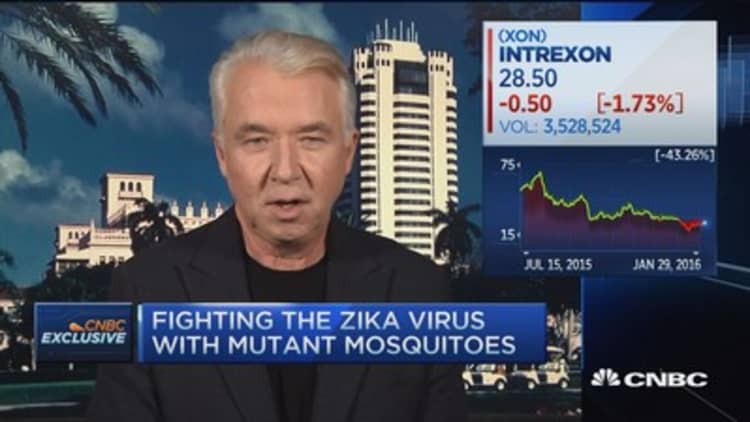
As the Zika virus spreads across the Americas, investors are turning their attention to U.S. companies developing treatments, vaccines or other products tied to the mosquito-borne disease.
With no vaccines or treatments for Zika, which has been linked to a surge in babies born with unusually small heads, researchers are scrambling to find ways to stop the threat.
The company Oxitec, a subsidiary of biotech firm Intrexon, is currently in the spotlight for producing genetically modified mosquitoes that can be used as a tool to compete with normal Aedes aegypti mosquitoes that transmit the virus.
"We think we have the only proven, practical and ready-to-deploy solution," Intrexon CEO Randal Kirk said Friday on CNBC's "Closing Bell."
Oxitec is able to breed male mosquitoes that stop the spread of Zika by passing along a gene to their offspring that makes them die young. Currently, tests are being conducted in Brazil, Panama and the Cayman Islands to cut down the targeted Aedes aegypti mosquito population.
Intrexon shares jumped 10 percent on strong volume Thursday, when the World Health Organization warned the Zika virus was "spreading explosively" and could infect as many as 4 million people in the Americas.
On Friday the stock rose slightly, however it is still down 3.4 percent so far this year, though it has held up better than the Nasdaq biotechnology index, which has fallen 21 percent.
The investment reaction is reminiscent of the deadly Ebola virus outbreak that began in 2014 and spread to the United States before being contained. Shares of some small companies that were developing Ebola treatments and related products soared during the frenzy over the disease, though some of the gains were short-lived.
"With regard to value, we focus on intrinsic value at Intrexon," said Kirk. "We don't try to really influence to any great extent the market value other than by growing intrinsic value because over the course of my career, it has seen to me that's the best strategy to obtain the ultimate result."
The treatment for the Zika virus may not be profitable for Intrexon today, however, it "most definitely can be" in the future, added Kirk.
Brazil has reported 3,893 suspected cases of microcephaly, the WHO said last week, over 30 times more than in any year since 2010 and equivalent to 1-2 percent of all newborns in the state of Pernambuco, one of the worst-hit areas.
To stop the further spread of the virus, the U.S. Centers for Disease Control and Prevention on Tuesday added the United States Virgin Islands and Dominican Republic to the expanding list of territories and countries that have experienced Zika outbreaks. The 23 other countries on the list include popular vacation destinations such as Puerto Rico, Mexico and Barbados.
— Reuters contributed to this article.



